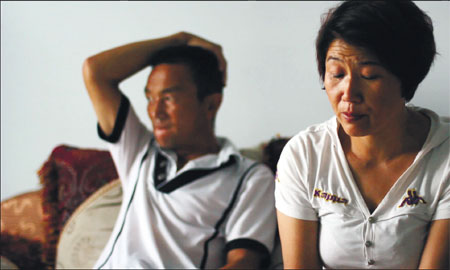The heartbreak of child abduction
Updated: 2013-08-23 14:18
By Kelly Chung Dawson in New York (China Daily)
|
||||||||
|
In Living with Dead Hearts, a film about abducted children in China, the parents of a missing 12-year-old girl discuss their anguish: 'Unable to tell day from night.' Provided to China Daily |
When children are abducted in the US, the vast majority of cases involve family members. At around 200 per year, true kidnappings in which children are taken by strangers for molestation, murder or ransom are relatively rare. Those held for ransom are usually the children of wealthy families, with resources to match demands. In stark contrast are the poor, often uneducated families of an estimated 70,000 children who go missing in China each year for forced labor, adoption or prostitution.
Living with Dead Hearts, a new film by Tech in Asia blogger Charlie Custer and his wife Leia Lee, explores the problem, which despite death sentences for convicted child traffickers and the reported police recovery of more than 8,000 children in 2011 has grown steadily since the 1980s.
"Our goal for the film is for as many people to see it as possible so that awareness of the problem increases," Custer told China Daily. "It's amazing how many people don't know about this even in China, or have some vague inkling that it's happening but have no idea of the scale."
The number of children who go missing each year fluctuates wildly depending on the source. Earlier this year China National Radio estimated that 200,000 children are abducted in China each year, but the government officially estimates that number to be 10,000. For the purposes of the film, Custer consulted independent contractors who estimated that 70,000 children are lost each year.
Living with Dead Hearts presents the stories of the Lei, Liu and Yuan families. Lei Xiaoxia, 12, disappeared from her school; her teacher failed to report her absence for hours after she had disappeared, and later police admitted to having failed to check surveillance tapes outside the campus before they were erased.
"The feeling of losing your child, it's like being hopeless," Xiaoxia's mother says in the film. "We are living with dead hearts."
Liu Jingjun was 2 when he disappeared from an alleyway behind his home in Taiyuan, Shanxi province. "For a month after we lost him, [Liu's mother] and I couldn't even tell day from night," his father says.
Most of the children abducted in China are boys sold to families who already have daughters but are reluctant to flout the country's one-child policy, or unable to pay the steep fines that result from a second child. Long-standing preferences for male children can net traffickers a significant sum for an infant boy. State media reports have estimated that an abducted child can be worth anywhere between 30,000 and 80,000 yuan ($4,900 to $13,000).
Other children are sold to corrupt state-run orphanages, and in cases in which the adoptive families are from elsewhere in the world, the children are essentially considered irretrievable once they have left the country.
Although police involvement can help, the vast majority of cases go unsolved. As someone in the film tells a grieving family member who repeatedly calls his local police chief: "In your home the sky has fallen, but nothing has happened in his."
Police are generally reluctant to commit resources toward solving child abduction cases, Custer said. Even when time-consuming investigations do lead to the successful return of a child, the pay-off is small. Low-level police are unlikely to see extra money in kickbacks or recognition in the way of career advancement. In some cases, the police actually work with the kidnappers, although evidence of corruption is difficult to track, the film notes.
The one-child policy plays a part in the problem, but Custer believes that putting the blame on the policy is simplistic. The demand for kidnapped children in China already exists, and eliminating the policy wouldn't fix the problem, he has said.
One father in the film discusses his travels around China in search of "black kilns", forced-labor hubs in which abducted children have been put to work. He reports having rescued more than 100 children. For viewers in search of a happy ending, Living with Dead Hearts offers no easy answers.
In a statement to the supporters who funded the $7,500 online Kickstarter fund that made the film possible, Custer wrote: "Although we considered a lot of approaches during and even after filming, ultimately we decided to make a film that we felt best reflected the reality of the situation as we saw it, rather than the film that told the best or the most entertaining story."
Living with Dead Hearts notes that in the time it takes to watch the film, 10 more children will be kidnapped. Watch it for free at Livingwithdeadhearts.com.
kdawson@chinadailyusa.com
(China Daily USA 08/23/2013 page11)
Most Viewed
Editor's Picks

|

|

|

|

|

|
Today's Top News
McCain comments about Diaoyu draw fire
Chinese scientists asked to improve toilet
Bo Xilai denies bribery charges
Experts say police need guns on patrol
Nasdaq resumes stock trading
German mitten crabs not 'qualified for import'
Chinese netizens debate upping retirement age
Egypt's Mubarak leaves prison
US Weekly

|

|
















